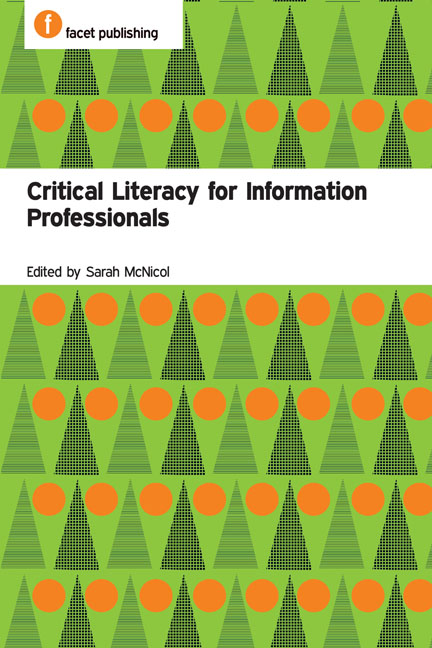Book contents
- Frontmatter
- Contents
- Contributors
- Introduction
- PART 1 THEORIES OF CRITICAL LITERACY
- PART 2 CRITICAL LITERACY IN PRACTICE
- 8 A picture is worth a thousand words: teaching media literacy
- 9 Curricular and extra-curricular opportunities to engage school students in critical literacy in England
- 10 New media and critical literacy in secondary schools
- 11 Critical literacy and academic honesty: a school librarian's role and contribution
- 12 Engaging undergraduate communications students in critical information literacy
- 13 Exploring pedagogical implications of students’ search mediation experiences through the lens of critical information literacy
- 14 Diffusing critical web literacy in a teacher-education setting: initial reflections and future planning
- Further information
- Index
11 - Critical literacy and academic honesty: a school librarian's role and contribution
from PART 2 - CRITICAL LITERACY IN PRACTICE
Published online by Cambridge University Press: 08 June 2018
- Frontmatter
- Contents
- Contributors
- Introduction
- PART 1 THEORIES OF CRITICAL LITERACY
- PART 2 CRITICAL LITERACY IN PRACTICE
- 8 A picture is worth a thousand words: teaching media literacy
- 9 Curricular and extra-curricular opportunities to engage school students in critical literacy in England
- 10 New media and critical literacy in secondary schools
- 11 Critical literacy and academic honesty: a school librarian's role and contribution
- 12 Engaging undergraduate communications students in critical information literacy
- 13 Exploring pedagogical implications of students’ search mediation experiences through the lens of critical information literacy
- 14 Diffusing critical web literacy in a teacher-education setting: initial reflections and future planning
- Further information
- Index
Summary
Introduction
Academic honesty and academic integrity are terms in common currency, especially in tertiary education. However, the specific term ‘academic honesty’ is used by the International Baccalaureate (IB), an independent, international organization that has developed curricula in the primary and secondary sectors of education. Academic honesty is considered to be a significant feature in IB philosophy. The terms academic honesty or academic integrity are often considered to be the antithesis of the term ‘plagiarism’; for example, the UK's Higher Education Academy (HEA) and JISC (2010) produced a guide to Supporting Academic Integrity which is heavily focused on plagiarism. The IB, however, takes a more holistic and more positive view; it argues that ‘academic honesty must be seen as a set of values and skills that promote personal integrity and good practice in teaching, learning and assessment’ (International Baccalaureate, 2011, 2). Therefore, within the IB definition, there are expectations that students will develop skills in the techniques or mechanics of academic honesty, but also that they will realize and practise ethical standards with regard to academic honesty. In contrast to the IB approach, literature in library and information science tends to be strong on references to the techniques and skills development needed with regard to avoiding plagiarism, but there is less focus on the affective arena, whereby students develop principles and values with regard to their practice of academic honesty.
This chapter describes a librarian's contribution not merely to teaching the basic precautions necessary to avoid plagiarism but also to the higher-level critical thinking skills and aptitudes that students need in order to successfully meet the demands of academic-honesty principles and standards as part of the IB programme. The following section focuses on the role of academic honesty within the IB Diploma Programme (IBDP) course for 16- to 18-year-old students.
The IB Diploma Programme
Although academic honesty is a central part of IB philosophy throughout IB curricula, there are specific requirements for students and schools that undertake the IBDP, a curriculum for students in their last two years of secondary education (16–18 years of age). This curriculum is generally considered to be helpful and an appropriate preparation and experience for studying at tertiary level, as it involves considerable externally assessed enquiry and research assignments.
- Type
- Chapter
- Information
- Critical Literacy for Information Professionals , pp. 123 - 128Publisher: FacetPrint publication year: 2016
- 2
- Cited by



